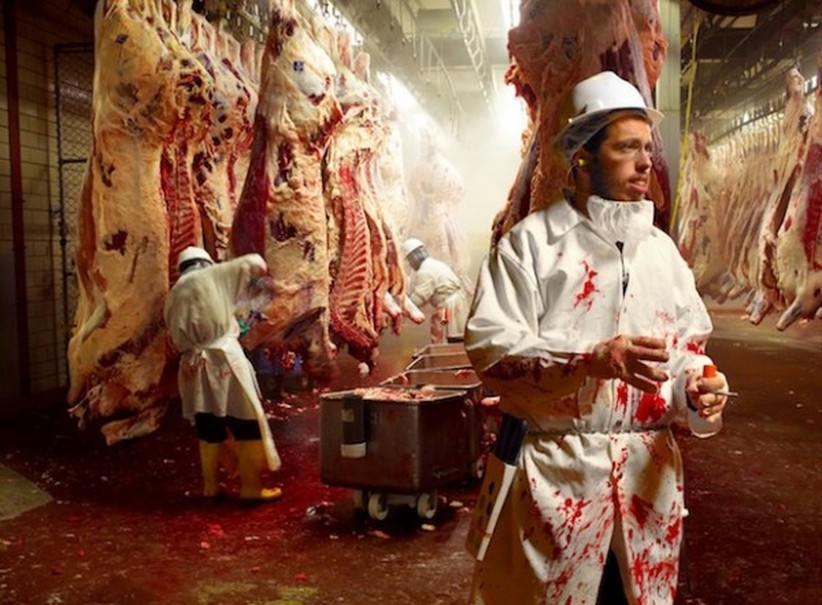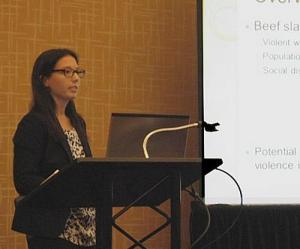I had the pleasure of presenting at the American Sociological Conference last August in San Francisco with a panel of several talented female scholars in the field of Animals & Society. One such presentation, that of Racine Jacques, a Ph.D. student at the University of Central Florida, especially caught my attention because of its implications for vegan feminist theory. Ms. Jacques had discovered a very strong relationship between rape and the presence of “beef” slaughterhouses in the community. This relationship remained strong even when controlling for a number of other variables typically responsible for increases in crime rates. She reports that the presence of a slaughterhouse corresponds with a 166% increase in arrests for rape. Her study looks at other forms of crime, but rape stands out as especially significant.
This study partially confirms what vegan feminist scholars have been theorizing for some decades: Violence against women and violence against animals are closely entangled and likely aggravated by patriarchal rule and capitalist economics. In a society where the bodies of women and other animals are considered commodities and resources for the privileged, it should come as no surprise to find intersections of violence.
Ms. Racine’s study, “Social Disorganization in Slaughterhouse Communities,” is due to be published in an upcoming issue of Society & Animals. A more nuanced discussion of the race and class oppression felt by the slaughterhouse workers themselves is included in her analysis.
 Dr. Wrenn is Lecturer of Sociology and past Director of Gender Studies (2016-2018) with Monmouth University. She received her Ph.D. in Sociology with Colorado State University in 2016. She received her M.S. in Sociology in 2008 and her B.A. in Political Science in 2005, both from Virginia Tech. She was awarded Exemplary Diversity Scholar, 2016 by the University of Michigan’s National Center for Institutional Diversity. She served as council member with the American Sociological Association’s Animals & Society section (2013-2016) and was elected Chair in 2018. She serves as Book Review Editor to Society & Animals and has contributed to the Human-Animal Studies Images and Cinema blogs for the Animals and Society Institute. She has been published in several peer-reviewed academic journals including the Journal of Gender Studies, Feminist Media Studies, Disability & Society, Food, Culture & Society, and Society & Animals. In July 2013, she founded the Vegan Feminist Network, an academic-activist project engaging intersectional social justice praxis. She is the author of A Rational Approach to Animal Rights: Extensions in Abolitionist Theory (Palgrave MacMillan 2016).
Dr. Wrenn is Lecturer of Sociology and past Director of Gender Studies (2016-2018) with Monmouth University. She received her Ph.D. in Sociology with Colorado State University in 2016. She received her M.S. in Sociology in 2008 and her B.A. in Political Science in 2005, both from Virginia Tech. She was awarded Exemplary Diversity Scholar, 2016 by the University of Michigan’s National Center for Institutional Diversity. She served as council member with the American Sociological Association’s Animals & Society section (2013-2016) and was elected Chair in 2018. She serves as Book Review Editor to Society & Animals and has contributed to the Human-Animal Studies Images and Cinema blogs for the Animals and Society Institute. She has been published in several peer-reviewed academic journals including the Journal of Gender Studies, Feminist Media Studies, Disability & Society, Food, Culture & Society, and Society & Animals. In July 2013, she founded the Vegan Feminist Network, an academic-activist project engaging intersectional social justice praxis. She is the author of A Rational Approach to Animal Rights: Extensions in Abolitionist Theory (Palgrave MacMillan 2016).


